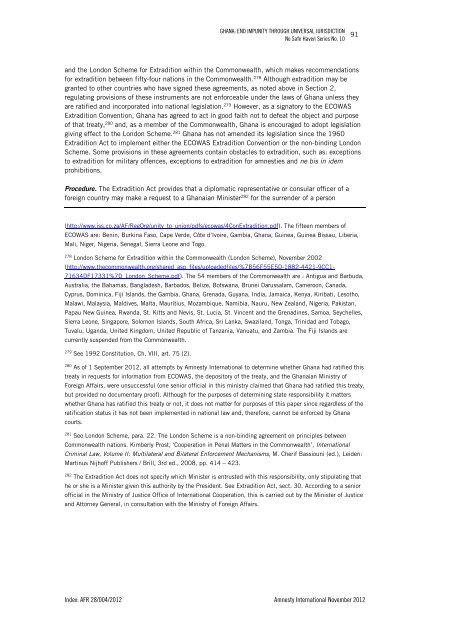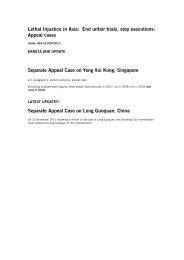Ghana - Amnesty International
Ghana - Amnesty International
Ghana - Amnesty International
Create successful ePaper yourself
Turn your PDF publications into a flip-book with our unique Google optimized e-Paper software.
GHANA: END IMPUNITY THROUGH UNIVERSAL JURISDICTIONNo Safe Haven Series No. 1091and the London Scheme for Extradition within the Commonwealth, which makes recommendationsfor extradition between fifty-four nations in the Commonwealth. 278 Although extradition may begranted to other countries who have signed these agreements, as noted above in Section 2,regulating provisions of these instruments are not enforceable under the laws of <strong>Ghana</strong> unless theyare ratified and incorporated into national legislation. 279 However, as a signatory to the ECOWASExtradition Convention, <strong>Ghana</strong> has agreed to act in good faith not to defeat the object and purposeof that treaty, 280 and, as a member of the Commonwealth, <strong>Ghana</strong> is encouraged to adopt legislationgiving effect to the London Scheme. 281 <strong>Ghana</strong> has not amended its legislation since the 1960Extradition Act to implement either the ECOWAS Extradition Convention or the non-binding LondonScheme. Some provisions in these agreements contain obstacles to extradition, such as: exceptionsto extradition for military offences, exceptions to extradition for amnesties and ne bis in idemprohibitions.Procedure. The Extradition Act provides that a diplomatic representative or consular officer of aforeign country may make a request to a <strong>Ghana</strong>ian Minister 282 for the surrender of a person(http://www.iss.co.za/AF/RegOrg/unity_to_union/pdfs/ecowas/4ConExtradition.pdf). The fifteen members ofECOWAS are: Benin, Burkina Faso, Cape Verde, Côte d’Ivoire, Gambia, <strong>Ghana</strong>, Guinea, Guinea Bissau, Liberia,Mali, Niger, Nigeria, Senegal, Sierra Leone and Togo.278London Scheme for Extradition within the Commonwealth (London Scheme), November 2002(http://www.thecommonwealth.org/shared_asp_files/uploadedfiles/%7B56F55E5D-1882-4421-9CC1-71634DF17331%7D_London_Scheme.pdf). The 54 members of the Commonwealth are : Antigua and Barbuda,Australia, the Bahamas, Bangladesh, Barbados, Belize, Botswana, Brunei Darussalam, Cameroon, Canada,Cyprus, Dominica, Fiji Islands, the Gambia, <strong>Ghana</strong>, Grenada, Guyana, India, Jamaica, Kenya, Kiribati, Lesotho,Malawi, Malaysia, Maldives, Malta, Mauritius, Mozambique, Namibia, Nauru, New Zealand, Nigeria, Pakistan,Papau New Guinea, Rwanda, St. Kitts and Nevis, St. Lucia, St. Vincent and the Grenadines, Samoa, Seychelles,Sierra Leone, Singapore, Solomon Islands, South Africa, Sri Lanka, Swaziland, Tonga, Trinidad and Tobago,Tuvalu, Uganda, United Kingdom, United Republic of Tanzania, Vanuatu, and Zambia. The Fiji Islands arecurrently suspended from the Commonwealth.279See 1992 Constitution, Ch. VIII, art. 75 (2).280As of 1 September 2012, all attempts by <strong>Amnesty</strong> <strong>International</strong> to determine whether <strong>Ghana</strong> had ratified thistreaty in requests for information from ECOWAS, the depository of the treaty, and the <strong>Ghana</strong>ian Ministry ofForeign Affairs, were unsuccessful (one senior official in this ministry claimed that <strong>Ghana</strong> had ratified this treaty,but provided no documentary proof). Although for the purposes of determining state responsibility it matterswhether <strong>Ghana</strong> has ratified this treaty or not, it does not matter for purposes of this paper since regardless of theratification status it has not been implemented in national law and, therefore, cannot be enforced by <strong>Ghana</strong>courts.281See London Scheme, para. 22. The London Scheme is a non-binding agreement on principles betweenCommonwealth nations. Kimberly Prost, ‘Cooperation in Penal Matters in the Commonwealth’, <strong>International</strong>Criminal Law, Volume II: Multilateral and Bilateral Enforcement Mechanisms, M. Cherif Bassiouni (ed.), Leiden:Martinus Nijhoff Publishers / Brill, 3rd ed., 2008, pp. 414 – 423.282The Extradition Act does not specify which Minister is entrusted with this responsibility, only stipulating thathe or she is a Minister given this authority by the President. See Extradition Act, sect. 30. According to a seniorofficial in the Ministry of Justice Office of <strong>International</strong> Cooperation, this is carried out by the Minister of Justiceand Attorney General, in consultation with the Ministry of Foreign Affairs.Index: AFR 28/004/2012 <strong>Amnesty</strong> <strong>International</strong> November 2012
















